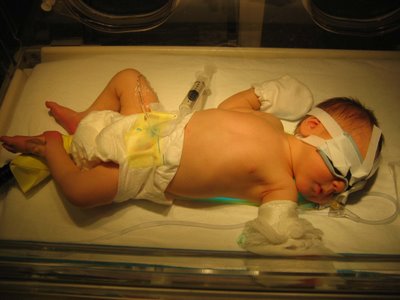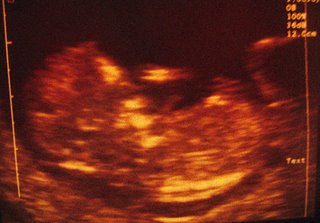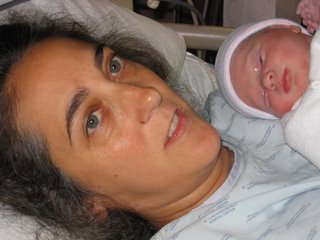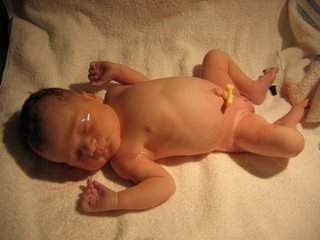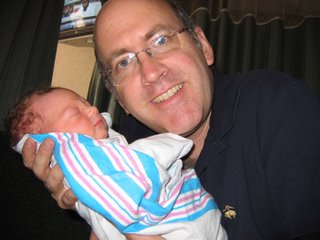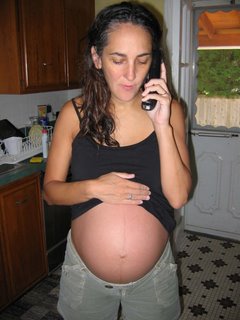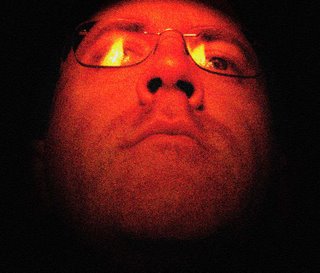ANOTHER STORY
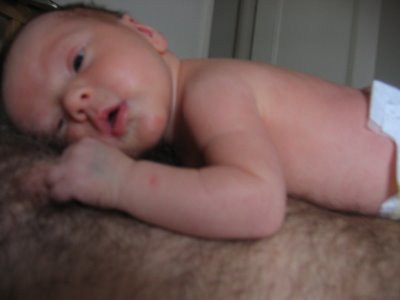
OK, I can't resist a cute photo of Frankie B. Now that that's out of the way, here's a story of mine from last year.
"R and R"
So he turned right onto the lake road instead of left onto the dirt road that led to their home, where the food was, and the liquor cabinet. He was tired and hungry, and he was sore from all the riding. Ever since they'd bought the house—a cottage, really, where they spent the summer weekends—he'd had more than his share of hikes and excursions into the insipidly pretty countryside, with its green hills and fields and old stone houses. Then there were the trips to local wineries and museums, parks and antiques shops, none of which particularly interested him. But he smiled through it all, noting the effect his good behavior had on his wife, and secretly lived for the evenings, when he would pour himself a gin and tonic, turn on the news, and relax.
The old lake abutted the road down at the bottom of the hill so closely that it sometimes overflowed after a hard rain, stopping traffic. It had no name, as far as he knew, just "the old lake," though it was more a pond, just a blue dot on the road maps, overgrown at this time of year with algae, and populated with some geese, a few ducks, and the family of swans.
He braked by the side of the road, set down the bike and stretched his aching back. It's not natural, he thought—all one's weight concentrated on such a narrow, thinly cushioned seat. His wife pulled up next to him and said, "There they are."
The flock of swans floated about fifty feet out, the parents side by side, the cygnets close by. The adults echoed the white of clouds reflected on the lake's surface, their long necks shaped like question marks. The babies were larger than last week, each about the size of a football now, but remained toy-like, their down like the fur of a kitten. They all seemed so content, one big happy family out for a stroll, enjoying the late summer breeze that rolled across the placid water.
"They're so adorable," his wife said, setting her bike down next to his.
Looking at her now, beside this lake, her face still pink from the exertion of riding, her eyes soft with sentimentality, he thought she appeared as healthy and sane as she'd been in a long time. Over the summer she'd put back on some of her old weight, softening the sharp angles that had surfaced on her face. And she seemed to be breathing slower and deeper these days, like a person in repose, not so tense and breathless. She looked up at him now and smiled.
"Aren't they?" she asked.
He smiled back, knowing they'd be home soon. He would sit on the deck, sipping his drink and reading a magazine, while she prepared dinner. What a relief not to spend every waking moment consoling her, watching helplessly as she wept, holding her until she finally fell asleep. Such jags still occurred, of course, but less and less frequently, so that he could now go off on his own, even if just to another room to have a cocktail in peace, without feeling guilty or worried.
"What's happening?" she asked.
One of the adult swans—he couldn't tell if it was the male or female, they were so alike—seemed agitated. It spun in a half-circle, churning up water with its powerful legs.
"Something's underneath it," he said.
"A snapping turtle?"
"I don't know."
The swan, he could see now, was locked in some sort of battle below the surface of the water, and yet remained weirdly serene above, as if it did not want anyone to know what was happening. The other adult was paying close attention, while the babies floated nearby.
"Wait a minute," his wife said.
"What?"
"There are only four."
"Four cygnets?" He counted them.
"I could swear there were five before," she said.
Just then, from beneath the agitated adult swan, there emerged a dark gray head and thin neck.
"Oh my God," his wife said.
"Is that--?" he started, though by now it was clear.
The struggling cygnet opened its beak and let out a shrill cry before both parents moved in and, using their webbed feet, forced its head back under the surface.
"Oh my God," his wife repeated, covering her mouth. He could sense the tension coiling itself up inside her. "We have to do something," she said, her feet just inches from the scummy edge of the lake. "I'm going out there."
"Wait," he said.
He did not want her to go into the lake. The water was dark and thick with vegetation; she would get bogged down before reaching the swans. Plus these were wild, aggressive animals. He'd heard stories about swans attacking people, hissing and using their vast wings to knock them down. Perhaps they'd try to drown her as well, and he would have to jump into the muck to save her.
Meanwhile, the swans continued to flail away at the cygnet, abandoning now any attempt to appear composed. Despite their efforts, the baby was once again able to raise its head above the surface and screech.
His wife looked at him now with wide, terrified eyes, her mouth poised at the brink of a scream. How quickly, he thought, she can return to this state after so many months of relative calm and serenity. He recalled the doctor's recommendation—"She needs some good old-fashioned R and R," he'd said upon her release, inspiring images of sanitariums nestled in the Alps, "rest cures" for pampered society ladies. They'd laughed about it later on, he and his wife, after she'd recovered enough to make jokes about the whole ordeal.
"What can we do?" she cried out now.
He looked around for a rock, but the ground here by the lake was littered with small, useless pebbles. He ran across the road and picked up a chunk of loose asphalt. Then he returned to the shore and tossed the clumsy missile at the swans, trying not to hit them but to get just close enough to frighten them. The chunk of asphalt landed a few feet shy, barely making a splash. The swans ignored it.
"We have to do something!" she screamed.
He could see she was preparing to dive in, anticipating what it would take to swim out there to the swans.
"Listen," he said, "they must be doing this for a reason."
"What reason?"
"Maybe the baby is sick. That happens sometimes, in nature." Even as he said it, it sounded false, pathetic. "Maybe it has a broken wing or something."
"It seems fine to me," she said. "Look how it's struggling."
As if on cue, the cygnet's head reappeared, slick with lake scum.
His wife began to whimper, burying her face in his chest as the swan parents again went to work, forcing their baby under. Looking out at the lake, he noted how odd it was, all this violence going on beneath such a clear blue sky, the trees rustling gently in the breeze, the other water birds—the geese, the ducks, even the remaining cygnets—serenely floating on the old lake's algae-pocked surface. A jittery Monarch fluttered so close that he had to swat it away.
The swan parents continued to struggle for several more minutes, then, quite suddenly, returned to their previous state of calm.
"It's so cruel," his wife said.
He held her closely. "Let's go." It was unfair, he knew, but he was angry at her now, dreading the inevitable reliving of this trauma later on.
"No," she said. "Not yet." She stared out at the water. He put his arm around her. If someone passed by now, they would see a middle-aged couple taking in a bucolic scene.
"I should have done something," she said.
"It's not our job to intervene," he said, thinking of those gruesome nature shows on television, on which wild animals murder one another as camera crews look on.
"Nonsense," she said. "I should've swum out there and…"
Then, unbelievably, the cygnet appeared again, its tiny bill silently grabbing at the air.
His wife tried to pull away from him, toward the lake, her mind made up now.
"No!" he shouted, barely holding onto her. She leaned away from him, putting all her weight into the effort.
"Let me go," she hissed, but he held tight, pulling her toward him and wrapping his arms around her.
The swans were upon the cygnet again. The baby, by now too weak to fight, gave out one last high-pitched shriek before being pushed under. There was no struggle this time.
His wife collapsed to the ground, her knees on the hard dirt, and sobbed.
"I can't believe I let that happen," she cried into her hands.
He waited a few minutes, allowing her to get it out of her system. On the other side of the lake, about one hundred yards away, a row of simple cottages lined the shore. They could have bought one of these, but it was thousands of dollars more for lakefront property, even if the lake was unswimmable. And they were earning half as much now that she wasn't working. Even with their less expensive home, they had to stretch every dollar. There was the mortgage, the taxes, the gas, on top of all their expenses in the city, from rent and transportation to the inevitable parking tickets. Then there were the extra medical expenses, the ones his insurance would not pay for. Still, it had all been worthwhile, just to see his wife laugh again, to hear her talk about something other than the grief and pain.
When her shoulders finally stopped heaving, he said, "Come on. Let's go home."
"Did you hear it?" she asked, looking up at him, her eyes pink and swollen. "How it cried?"
He could hear it still, echoing around the lake and off the trees. He would hear it in his sleep, if he got any tonight.
He held out his hand, urging his wife to stand. He led her to the bikes, lifting hers up for her. It was understood they would walk the bikes the short distance home. Balance was out of the question. He lifted his own bike onto its wheels and started up the hill, but his wife lingered and gazed out on the water. The adult swans floated blithely away, toward the middle of the lake, followed by the four surviving cygnets. At the spot where the killing took place the water was now as smooth as glass.
He called her name but she did not turn.
From half-way up the hill he watched the sun edge itself below the tree line, plunging the lake into shadow. A chill rolled up his spine, reminding him that summer was nearly over. In a few weeks they would close up the house, not to return until next Spring. Another long, cold winter in the city.
He called her name once more, but again she did not turn.
# # #
visit my website for more info!
